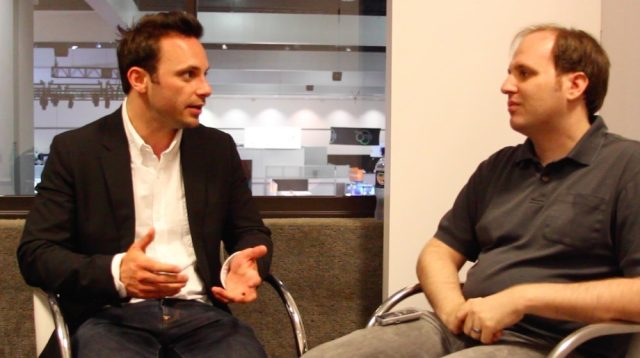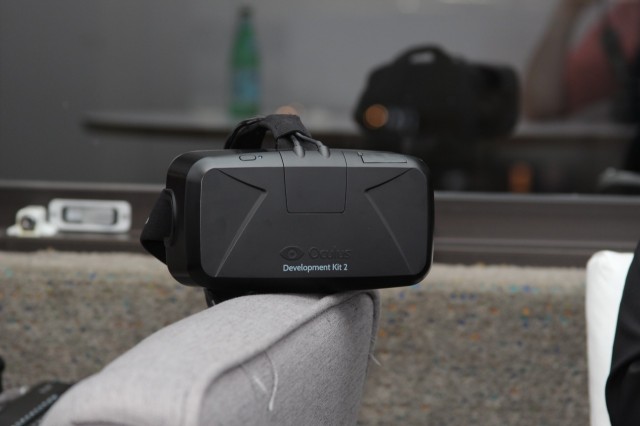
With a recent high-profile buyout to the tune of $2 billion, you might think Facebook and Oculus are expecting the forthcoming release of the first consumer-targeted Rift VR headset to be an immediate, multimillion-selling, console-level success. But in an E3 interview with Ars Technica, Oculus CEO Brendan Iribe scaled back expectations, saying that he's conservatively hoping for just "north of a million units [in sales]" over the life of the first consumer version of the Oculus Rift."
"It's not going to be a console-scale market," Iribe continued, regarding that first consumer unit, which still doesn't have an official price or release window. "It always could be, but that's not the goal. The goal is to set expectations low, get the enthusiasts and early adopters to get into the space, get their feedback, get developers making really great content..."
It's only after that first consumer version has been out for a year or two that Oculus will be ready to release its second consumer version, Iribe says. That's when he sees VR and the Rift really starting to reach their full potential, market-wise. "That's when we'll get these incredible, holy grail [games], the killer app for VR," he said. "And that's when we think the scale will really goal, and hopefully you'll get many millions of people into VR, playing great games and other stuff."
Interestingly enough, Ubisoft Vice President of Creative Lionel Raynaud said during GDC that it would take one million sales of VR headsets before the major publisher started investing in the space. Industry analyst Michael Pachter has said a million sales would be "a huge success for Oculus Rift [but] it’s just a hiccup for Sony" and Project Morpheus.
Of course, to hear Iribe tell it, Oculus has a history of undershooting actual demand when it comes to setting internal expectations. "We thought that the first developer kit was going to [sell] five to ten thousand units," Iribe told Ars. "Well, at least I thought that. [Founder] Palmer [Luckey] was going, 'No, it's only going to be a few hundred. What if this doesn't work?' So we had to compromise on our minimum expectation of it. Because VR just hasn't worked in the past, and even a few hundred for the launch of this early thing would have been great.
"Instead we sold 50,000."
VR content: “We need a lot more of it”
When I've talked to folks at Oculus in the past, they've given me a laundry list of technical areas that needed to be improved before the Rift was a consumer product. Iribe did say the first consumer version will "introduce a few new developments" not present in the second development kit and also "polish things off" in the form of better screen resolution, frame rate, and accuracy of tracking, as well as overall comfort.
But it seems that, at this point, the final piece to be filled in before the Rift is ready to sell to consumers is the actual platform, meaning the games and the distribution and monetization services that will power them. "We... need it to be a fun device to use and a fun platform to use," Iribe said. "And for that system to be fun, it needs content. Content sells hardware, right?"
While Iribe said that the Rift development community currently includes a lot of "very light, small experiences" that have popped up in the months since the release of the first Oculus Development Kit, he thinks the imminent release of the second dev kit will really jumpstart the development of fuller games made for virtual reality. In its meeting space, Oculus showed VR-capable demos of games ranging from upcoming AAA title Alien: Isolation to indie darling Superhot.

"In the near future, not necessarily the next few months, but a matter of months from now, hopefully—we always say less than two years, some kind of time from here—we're hoping there's a lot more rich, made-for-VR content that gives people things to do," Iribe said. "As that kind of comes together, we have the hardware in place for consumer V1, and there's a lot of content, and there's a platform and an ecosystem for people to be able to monetize, that will all come together for a consumer V1. There's a lot of rich content being made, but we need a lot more of it."
How many months will that all take, exactly? Iribe wouldn't be pinned down, but he did say that "it usually takes 6, 12, 18 months to make a new game or a new experience." And he said that clock really starts after the second developer kit ships to 40,000 preorderers next month, giving developers more accurate head-tracking, less image persistence, and a higher resolution to work with.
That game development timeline would seem to rule out a 2014 consumer release for the Rift hardware. But Iribe assured us the prototype clock can't keep running forever. "I think Palmer said 'If we haven't shipped by the end of 2015, that's a problem. At least we would be disappointed."
Selling at cost “would be great for everybody”
At this point, Iribe said the Facebook buyout won't actually have much of an impact on the technology Oculus is able to deliver in that first consumer Rift, whenever it comes. "It is going to allow us to deliver a much better consumer V2, that's for sure," he said. "Hardware-wise, we were pretty locked in already [for Version 1]... but [Facebook] will allow us to make consumer V2 totally incredible."
Where Facebook's money will be pivotal is in helping to build out that platform through a number of critical hires, like former Valve developer Jason Holtman to Naughty Dog cofounder Jason Rubin.
It's also going to help bring down the final price of the consumer unit by scaling up the production, Iribe said. "I think [the Facebook buyout] is going to allow us to deliver consumer V1 at a lower cost, because we're not trying to drive a high margin on this," he said. "[Facebook CEO] Mark [Zuckerberg], especially, wants to bring the cost down, him more than me. I do, too, but at the same time we were planning to run a business, hopefully a break-even [or] profitable business off of this, not a money-losing business. Mark is much more in the mindset of 'Let's get this to scale with the best quality product at the lowest cost possible.'"
"I'm hopeful we're not going to be losing money on [the hardware], but I think everybody agrees that if we can do it at cost that would be great for everybody," Iribe continued. "As Mark says, as you start to get to race to scale there are a lot of opportunities to monetize that are really great for consumers, because they get a really low-cost product."
We'll have more from our extensive interview with Iribe, including thoughts on public reactions to the Facebook buyout, augmented reality, and the state of VR controls, in the coming days.
reader comments
106